Innovating in France’s Auvergne-Rhône-Alpes RegionInnovating in France’s Auvergne-Rhône-Alpes Region
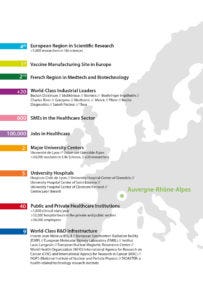
Figure 1: Auvergne-Rhône-Alpes, an innovative territory in the heart of Europe
Lyonbiopole is a French “bio-cluster” based in the Auvergne-Rhône-Alpes region surrounding Lyon (Figure 1). The cluster supports ambitious projects and companies in the broad health industry, counting more than 200 members including Lyonbiopole’s four founders: Sanofi Pasteur (the vaccines division of multinational pharmaceutical company Sanofi), bioMérieux (known worldwide for in vitro diagnostics and microbiological testing), Merial (an animal-health company that merged recently with Boehringer Ingelheim), and Becton Dickinson (supplier of flow cytometers, reagents, tools, and services). The region also is home to 17 research centers (including three hospital university centers), universities, training organizations, and nearly 180 small and midsize businesses (SMBs) engaged in life science. Philippe Archinard (Transgene’s chief executive officer) chairs the organization’s 10-member board, which includes representatives of premier companies, high-potential SMBs, and centers of excellence: the French National Alliance for Life Sciences and Health (Aviesan), the French Alternative Energies and Atomic Energy Commission (CEA), Lyon Hospital University, and the Mérieux Foundation.
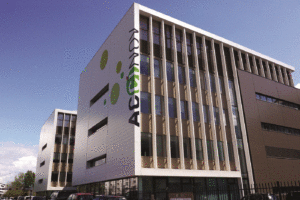
The Accinov facilities are located in Lyon, France. (HTTP://ACCINOV.COM, ©viewbox)
Lyonbiopole was built on distinctive Auvergne-Rhône-Alpes regional strengths in infectious disease, oncology, metabolic disease, medical technologies, personalized medicine, and neurosciences. The organization’s goal is to support emergence and development of innovative technologies, products, and services for personalized medicines that will benefit patients. Lyonbiopole focuses on four strategic areas: human medicine, veterinary medicine, in vitro diagnostics, and medical devices and technologies.
The group describes its mission as follows:
To promote emergence of innovative research and development (R&D) collaborative projects
To support SMBs in building strategic partnerships, accessing private investors, training employees, and building expertise
To foster internationalization of local SMBs and the overall cluster’s position at both the EU and international levels
To accelerate growth of the regional life-sciences sector by addressing its members’ needs for access to dedicated R&D laboratories, offices, and good manufacturing practice (GMP) biomanufacturing facilities.
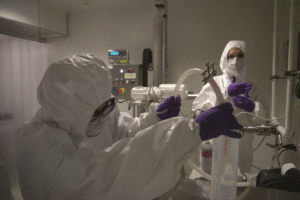
Accinov workers prepare media for cell culture. (HTTP://ACCINOV.COM, ©viewbox)
About Accinov
Accinov is a next-generation GMP biomanufacturing center (1): a “do-it-yourself” concept in capacity strategy. The company is pioneering a biomanufacturing model that is unique in the pharmaceutical and biotechnology industries, providing both a GMP environment and pharmaceutical responsibility as a service. Its facility is built to support biopharmaceutical companies in developing innovative drugs and breakthrough technologies.
Accinov provides emerging companies with ready-to-use GMP pilot units and laboratories. It also provides services to assist in their R&D activities or enable clients to manufacture innovative products (e.g., new drugs and medical devices) themselves in compliance with regulated quality standards (both GMP and International Organization for Standardization, ISO). Recently, Lyonbiopole welcomed MaaT Pharma to Accinov’s biomanufacturing center.
Case Study: MaaT Pharma
MaaT stands for “microbiota as a therapy,” and that describes the approach of entrepreneurial biopharmaceutical company MaaT Pharma. Founders Hervé Affagard and Pierre Bélichard met in 2014. Respectively, they are an entrepreneur and a former healthcare company executive. Bélichard was founder of Enterome Biosciences as well as vice president of mergers, acquisitions, and business development at Sanofi Ophthalmology.
For personal reasons, Affagard was deeply interested in dysbiosis (imbalance of gut microbiota): microbial imbalances or maladaptation in humans. Pierre Bélichard was working in the development of novel diagnostics and pharmaceuticals to support personalized therapies in microbiome-related diseases such as inflammatory bowel disease (IBD). The two men decided to team up in search of a cure for iatrogenic dysbiosis. They were soon joined by two world-renowned experts in hematology (Mohamad Mohty at the Saint-Antoine Hospital and University of Pierre & Marie Curie) and intestinal microbiology (Joël Doré of the French National Institute for Agricultural Research and MetaGenoPolis). MaaT Pharma came about under the umbrella of Seventure Partners, a French venture capital firm that has supported the company since its inception. Affagard led his group in a year of intensive work to establish the business case, and MaaT Pharma was established in December 2014.
This is the first company to work on an autologous transfer process to treat serious diseases linked to gut microbiota imbalances. It currently focuses on patients who suffer from leukemia and bone and joint infections, the major treatment of which contributes to dysbiosis. MaaT Pharma’s young and dynamic operations team is pioneering work in the symbiotic relationship between humans and their microbiota. The company stresses a boundary-free work environment in developing its first therapeutic candidate using a proprietary autologous fecal microbiota transfer platform.
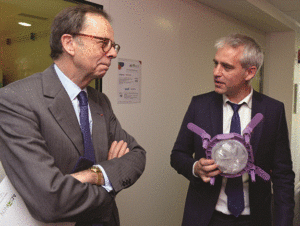
MaaT Pharma executive discusses the technology with Louis Schweitzer, the French general commissioner for investment. (HTTP://MAATPHARMA.COM)
MaaT Pharma has been working fast. From 2014 to 2016 it went from a strategic plan to ownership of multiple patents and clinical studies operating in six medical centers. On 3 November 2016 it opened the first GMP-compliant fecal microbiota transfer platform in Europe. The company also announced the first positive safety review from the Data and Safety Monitoring Board (DSMB) as well as continuation of the phase 1 Odyssée study focusing on prevention of dysbiosis complications in patients under treatment for acute myeloid leukemia. On 23 November, Affagard was awarded Entrepreneur of 2016 by France Biotech (2), the association of French companies and their partners in the life-science sector.
Why the Auvergne-Rhône-Alpes Region? Lyon is in the heart of one of the most dynamic health regions in France and Europe overall. The biodistrict in Lyon Gerland was an obvious place to be. MaaT Pharma’s medicinal product development requires a close relationship with key stakeholders in clinical research, supply chain, microbiology, and GMP laboratory hosting. The Accinov services were a key element in the fast-paced development of MaaT Pharma. The start-up received very strong support from Lyonbiopole to initiate business collaboration and from the Grand Lyon urban community to recruit some of its 12 employees.
As the birthplace of life science in France, Lyon has one of the most advanced pharmaceutical industries in the world. This sector includes a wide range of specializations such as pharmaceutical biotechnology, medical technologies, and dermocosmetology. Lyonbiopole is a world center of excellence in infectious diseases and immunology, vaccines, diagnostics, oncology, and neurology — and home to the top neurological hospital in Europe.
Lyon University Hospitals (HCL) is home to 5,000 physicians and 5,400 hospital beds — a significant portion of the region’s 40 hospitals and 32,000 beds. Rhône-Alpes is Europe’s top region (and second in the world) for foreign investment, and it is first in the world for human vaccine production (Sanofi Pasteur), veterinary products (Merial), and bacteriological diagnostics (bioMérieux). In all, 6,500 biologic researchers work in the region, where 20,000 higher-education students are studying life sciences.

Most bioexecutives know well the challenges of explaining their company’s technology to lay audiences. (HTTP://MAATPHARMA.COM)
Early Challenges: MaaT Pharma’s objective is to treat iatrogenic dysbiosis for frail patients. Its initial challenges were related to preclinical demonstration of the approach to hemostasis reconstruction in addition to defining an ad hoc regulatory framework for this unique technology. Once those two milestones were passed, the company immediately transferred clinical production lots into the Accinov biomanufacturing center in close connection with the French regulatory agency.
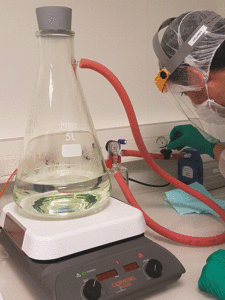
A MaaT Pharma formulator prepares bacteria-protecting diluent. (HTTP://MAATPHARMA.COM)
Biomanufacturing Strategy: Uncertainty and risk are major issues in the early stages of biological product development, and biomanufacturing strategy is especially critical for drug sponsor companies developing innovative products. Flexibility, time, and cost are key in evaluating options to find the best path forward.
Accinov was able to propose a biomanufacturing solution perfectly suited to the start-up’s needs and product development stage. The capacity-rental approach allows MaaT Pharma to run its own processes with its own manufacturing resources in a flexible facility, and the company benefits from expert advice, guidance, and hands-on support to accelerate and secure its drug development.
A Regional Ecosystem: The Auvergne-Rhône-Alpes region is dynamic and full of resources for startups looking to grow in the life sciences. MaaT Pharma has partnered with key players such as the French National Institute for Agronomic Research (for preclinical demonstrations of microbiota reconstruction), Lyonbiopole (as a hub for business collaborations), Accinov (for production of clinical lots), and Adderley Featherstone (for recruitment).
The Auvergne-Rhône-Alpes ecosystem also is home to dynamic and innovative programs such as the nonprofit BigBooster. It is a unique acceleration program designed to help startups improve their business proposals and access the US market. In 2015, MaaT Pharma took part of the first BigBooster competition and reached the top 10 as a finalist. That experience helped the company fine-tune its pitch for presenting its technology to nonmedical audiences. The startup also was able to meet with key investors and other interesting people throughout the nine-month program.
Looking to the Future: MaaT Pharma envisions expanding both geographically (throughout Europe and into the United States) and into different therapeutic areas (cancer and infectious diseases). Those developments will be steered by additional preclinical and clinical activities toward four phase 2 trials within the next two years.
The integration between different shareholders all working in diagnostics and therapeutics development in the same place is an absolute advantage of the Auvergne-Rhône-Alpes region. Thanks to a full range of support services, Lyonbiopole serves as a gateway to the area’s healthcare community, facilitating the emergence of innovative and strategic partnerships and companies like MaaT Pharma.
References
1 Peyrache S, Nagy A. Build, Buy . . . or “Rent” Capacity? A New GMP Biomanufacturing Business Model. BioProcess Int. 12(11) 2014: 48–51.
2 Choulika A. France Biotech Presents Results of Its 2010 Life-Sciences Survey. BioProcess Int. 9(6) 2011: 16–25.
Florence Agostino-Etchetto is chief executive officer of Lyonbiopole ([email protected]); http://lyonbiopole.com. Kévin Romani is director of SME development ([email protected]), and Stéphanie Colloud is chief executive officer of Accinov ([email protected]); https://accinov.com. Hervé Affagard is chief executive officer of MaaT Pharma ([email protected]); http://maatpharma.com.
You May Also Like






